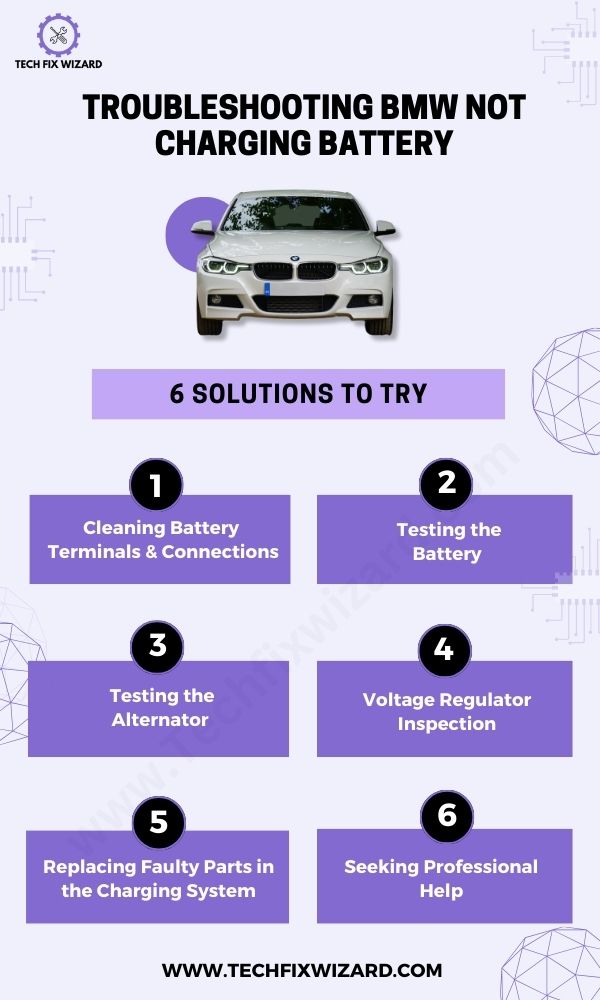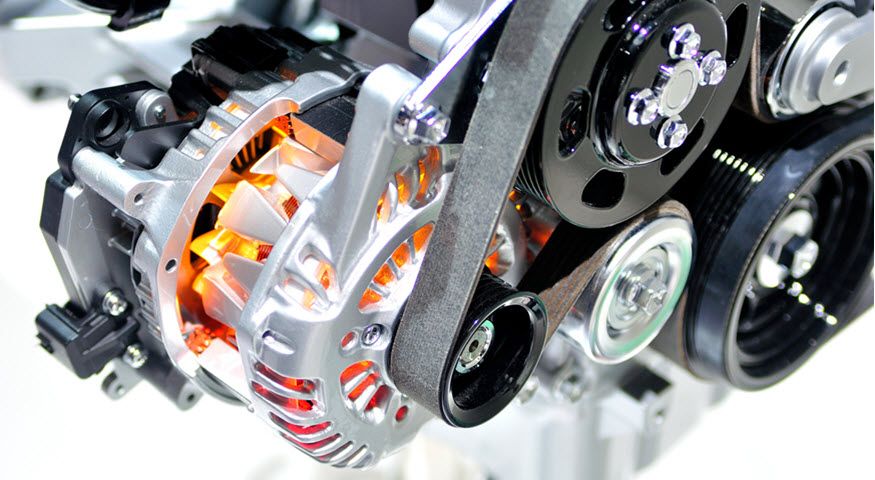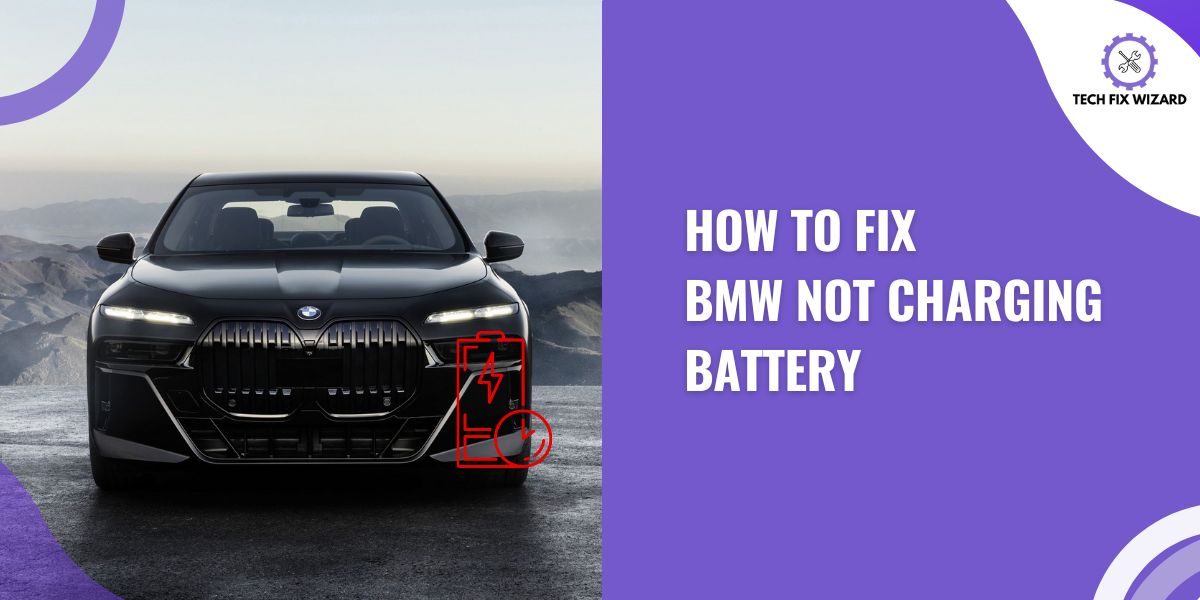BMW vehicles are known for their performance, luxury, and advanced technology. However, like any other automobile, they can experience occasional issues that require attention.
BMW not charging battery issue is one of the common issues faced by BMW owners.
A malfunctioning charging system can lead to a drained battery, resulting in frustrating situations such as being unable to start the vehicle.
In this article, we will explore some possible causes and solutions for the BMW not charging battery issue.
Let’s dive into it!
Contents
- 1 BMW Not Charging Battery – 6 Common Causes
- 2 Troubleshooting BMW Not Charging Battery – 6 Steps
- 3 1. Cleaning Battery Terminals and Connections
- 4 2. Testing the Battery
- 5 3. Testing the Alternator
- 6 4. Voltage Regulator Inspection
- 7 5. Replacing Faulty Parts in the Charging System
- 8 6. Seek Professional Assistance
- 9 FAQs
- 10 Why is my BMW not charging the battery?
- 11 How can I determine if the alternator is causing the problem?
- 12 What should I do if my BMW’s battery is damaged?
- 13 How can I check for loose or corroded battery connections?
- 14 Is it possible for a malfunctioning charging system to cause battery charging problems?
- 15 Can a blown fuse affect the battery charging in my BMW?
- 16 Why does my BMW’s battery drain quickly even after charging?
- 17 What is the average lifespan of a BMW battery?
- 18 Can using aftermarket accessories or modifications affect the battery charging system?
- 19 Should I always replace my BMW battery with an OEM (Original Equipment Manufacturer) battery?
- 20 Can extreme weather conditions affect the battery charging in a BMW?
- 21 What should I do if I have checked everything, but my BMW still isn’t charging the battery?
- 22 Official References & Resources
BMW Not Charging Battery – 6 Common Causes
| Cause | Description |
|---|---|
| 1. Malfunctioning Alternator | The alternator, responsible for charging the battery, may malfunction due to issues such as short circuits in the stator or rotor windings.
A faulty alternator leads to a lack of electricity generation, resulting in the battery not charging properly. |
| 2. Serpentine Belt Problems | If the serpentine belt is damaged or broken, it fails to transfer power from the engine to the alternator.
As a result, the alternator does not rotate, leading to no electrical power generation and the battery not receiving a charge. |
| 3. Insufficient Battery Capacity | Over time, the battery’s cells may wear out, leading to reduced capacity and the battery becoming too weak to hold an electrical charge effectively.
A weak battery triggers the battery charging system monitor to illuminate the battery light on the dashboard. |
| 4. Loose or Corroded Battery Cables | Loose battery cables can interfere with the charging process, causing flickering instrument cluster lights and abnormal behavior of accessories.
Corroded battery cables increase resistance and disrupt the flow of electricity to the battery. |
| 5. Corroded Battery Terminals & Electrical Flow Disruption | Battery terminals can corrode over time, increasing resistance and hindering the flow of electricity.
Corrosion can lead to poor electrical connections and affect the battery’s charging process, resulting in inadequate charging of the battery. |
| 6. Ground Wire Issues | The ground wire, connecting the negative battery terminal to the chassis, may degrade over time due to high temperatures and other factors.
A malfunctioning ground wire can disrupt proper battery charging, leading to insufficient charging of the battery. |
Troubleshooting BMW Not Charging Battery – 6 Steps
The following 6 steps will help you systematically diagnose and address the problem of your BMW not charging the battery.

Also Read: BMW Battery Not Charging Warning – 6 Troubleshooting Steps
1. Cleaning Battery Terminals and Connections
Cleaning battery terminals and connections is an essential initial step in troubleshooting battery-related issues.
It is crucial because, over time, corrosion can accumulate on the terminals and connections, impeding the proper flow of electricity between the battery and the charging system.
This buildup can result in a lack of charge or a completely dead battery.
By starting with this step, you ensure that you have a clean and reliable connection between the battery and the charging system.
| Step | Description |
|---|---|
| 1. Disconnect the negative cable from the battery | Ensure safety by disconnecting the negative cable before proceeding with cleaning. |
| 2. Mix a solution of baking soda and water | Create a cleaning solution using baking soda and water to remove corrosion. |
| 3. Scrub away corrosion with a wire brush | Gently scrub the battery terminals and connectors using a wire brush to remove buildup. |
| 4. Rinse with water and dry thoroughly | Rinse the terminals and connectors with water, then dry them thoroughly before reattaching the cables. |
| 5. Use a specialized terminal cleaner or replace damaged connectors | If there is persistent buildup or damaged connectors, consider using a terminal cleaner or replacing the connectors. |
2. Testing the Battery
After cleaning the battery terminals, it’s time to test the battery’s health to resolve the BMW not charging battery issue.
| Step | Description |
|---|---|
| 1 | Turn off the engine and ensure all electrical accessories are switched off. |
| 2 | Connect the red probe of the multimeter to the battery’s positive terminal (+) and the black probe to the negative terminal (-). |
| 3 | Measure the resting battery voltage using the multimeter. A fully charged battery should read around 12.6 volts or higher. |
| 4 | (Optional) Perform a load test by turning on headlights or other electrical loads while measuring the voltage to assess battery health. |
| 5 | Interpret the results by comparing the measured voltage to battery voltage charts or manufacturer’s specifications. |
| 6 | If the voltage is significantly low or fails the load test, consider charging or replacing the battery as necessary. |
You May Also Like: BMW Battery Not Charging While Stopped – [SOLVED]
3. Testing the Alternator
If you have ruled out the battery health issue as the cause of the BMW not charging battery issue, it is important to determine whether or not the alternator is responsible for the trouble in the battery charging process.
To test the alternator and determine if it is the cause of the BMW’s battery not charging issue, follow these steps:
| Step | Description |
|---|---|
| 1 | Start the engine and let it idle. |
| 2 | Turn on electrical accessories to put a load on the electrical system. |
| 3 | Set the multimeter to the DC voltage setting (at least 20 volts). |
| 4 | Connect the red probe of the multimeter to the positive battery terminal (+), and the black probe to the negative terminal (-). |
| 5 | Measure the voltage across the battery terminals while the engine is idling and accessories are turned on. |
| 6 | A properly functioning alternator should provide a voltage reading of around 13.5-14.5 volts or higher. |
| 7 | If the voltage reading is significantly lower, it suggests a potential issue with the alternator. |
| 8 | Consider replacing the alternator or seeking professional assistance for further inspection and diagnosis of the alternator. |
| 9 | Additional tests may be conducted, such as a voltage regulator inspection. |

4. Voltage Regulator Inspection
If you find issues with your alternator, it is crucial to test the performance of the voltage regulator as well. As voltage regulator is an integral part of the alternator, responsible for regulating and maintaining the correct voltage output.
A malfunctioning voltage regulator can directly impact the charging system of the alternator, leading to problems such as overcharging or undercharging the battery.
Therefore, testing the voltage regulator’s performance is essential in diagnosing and resolving alternator-related issues effectively.
The following steps can help you resolve the BMW not charging battery issue:
| Step | Description |
|---|---|
| 1 | Disconnect the negative terminal on your battery. |
| 2 | Locate the voltage regulator, which should be near or attached to the alternator. |
| 3 | Connect your multimeter to both terminals of the voltage regulator. |
| 4 | Start your car. |
| 5 | Check the multimeter readings while the car is running. |
| 6 | The multimeter should read between 13-14 volts, indicating proper functioning. |
| 7 | If the multimeter readings are outside of this range, consider replacing the voltage regulator. |
Also Read: BMW Electric Car Not Charging – 5 Causes & Solutions
5. Replacing Faulty Parts in the Charging System
If you conclude after testing all the major components of your charging system that they need replacement, follow the instructions below for replacing the battery, alternator, and voltage regulator.
1. Replace the Battery of Your BMW Car:
| Step | Description |
|---|---|
| 1. | Gather the necessary tools and equipment. |
| 2. | Park your BMW on a level surface and engage the parking brake. |
| 3. | Open the hood of your BMW and locate the battery. |
| 4. | Take note of the battery terminals’ positions and the cables connected to them. |
| 5. | Loosen and remove the negative (black) battery cable using a wrench or socket set. |
| 6. | Repeat the same process for the positive (red) battery cable. |
| 7. | Remove any clamps, brackets, or hold-downs securing the battery in place. |
| 8. | Carefully lift the old battery out of its compartment. |
| 9. | Clean the battery tray and terminals using a mixture of baking soda and water. |
| 10. | Place the new battery into the battery compartment, ensuring it is securely positioned. |
| 11. | Reattach any clamps, brackets, or hold-downs to secure the new battery in place. |
| 12. | Connect the positive (red) battery cable to the positive terminal of the new battery. |
| 13. | Repeat the same process for the negative (black) battery cable. |
| 14. | Double-check that all connections are secure and tight. |
| 15. | Close the hood of your BMW, ensuring it is fully latched. |
| 16. | Start your BMW and check whether the issue with battery charging has been resolved or not. |
| 17. | Properly dispose of the old battery at a recycling center or authorized facility. |
2. Replace The Alternator:
| Step | Description |
|---|---|
| 1. | Gather the necessary tools and equipment. |
| 2. | Park your BMW on a level surface and engage the parking brake. |
| 3. | Disconnect the negative battery cable. |
| 4. | Locate the alternator, found near the front of the engine. |
| 5. | Remove the electrical connections on the alternator. |
| 6. | Loosen and remove the mounting bolts securing the alternator. |
| 7. | Take out the old alternator from its mounting position. |
| 8. | Install the new alternator and tighten the mounting bolts. |
| 9. | Reconnect the electrical connections to the new alternator. |
| 10. | Reattach the negative battery cable. |
| 11. | Start the vehicle and check the alternator’s operation. |
3. Replace The Voltage Regulator:
| Step | Description |
|---|---|
| 1 | Turn off the engine and remove the key. Disconnect the negative terminal of the battery. |
| 2 | Identify the position of the voltage regulator near the alternator. |
| 3 | Disconnect the electrical connections attached to the voltage regulator. |
| 4 | Use appropriate tools to remove the mounting bolts or screws securing the regulator. |
| 5 | Align and secure the new voltage regulator in the mounting position. |
| 6 | Attach the electrical connections to the new voltage regulator. |
| 7 | Reconnect the negative terminal of the battery to restore power to the electrical system. |
Popular Pick: BMW Hybrid Battery Not Charging – 7 Steps To Follow
6. Seek Professional Assistance
If you are unable to resolve the issue by following the above troubleshooting steps, it may be a good time to seek professional help.
Professional mechanics and technicians have the expertise and specialized tools necessary to diagnose and repair complex automotive issues.
They can accurately identify the root cause of the problem and provide appropriate solutions. Additionally, they have access to technical resources and manufacturer-specific information that can aid in troubleshooting and resolving the issue effectively.
Seeking professional assistance ensures that your vehicle receives the necessary attention and expert care, helping to avoid further complications and potential damage.
FAQs
Why is my BMW not charging the battery?
There could be several reasons for this issue. Some common causes include a faulty alternator, a damaged battery, loose or corroded battery connections, or a malfunctioning charging system.
How can I determine if the alternator is causing the problem?
You can perform a simple test by using a multimeter to check the voltage output of the alternator.
If the reading is significantly lower than the recommended voltage, it indicates a potential issue with the alternator.
What should I do if my BMW’s battery is damaged?
If your battery is damaged or not holding a charge, it may need to be replaced.
Consult your BMW dealership or a qualified mechanic to determine the correct battery type and have it installed properly.
How can I check for loose or corroded battery connections?
Start by visually inspecting the battery terminals for any signs of corrosion or looseness.
If you notice any issues, clean the terminals with a battery terminal cleaner and ensure they are tightly connected.
Is it possible for a malfunctioning charging system to cause battery charging problems?
Yes, a malfunctioning charging system, such as a faulty voltage regulator or wiring issue, can prevent the battery from charging properly.
It’s recommended to have the charging system checked and repaired by a professional.
Can a blown fuse affect the battery charging in my BMW?
Yes, a blown fuse in the charging circuit can interrupt the flow of power and prevent the battery from charging.
Inspect the fuses related to the charging system and replace any blown fuses.
Why does my BMW’s battery drain quickly even after charging?
There might be a parasitic draw on the battery, caused by a component or system that continues to consume power even when the vehicle is off.
A professional diagnosis is recommended to identify and fix the issue.
What is the average lifespan of a BMW battery?
The lifespan of a BMW battery can vary depending on usage and maintenance. On average, a BMW battery can last between 4 to 6 years.
However, factors like extreme temperatures and driving habits can affect its lifespan.
Can using aftermarket accessories or modifications affect the battery charging system?
Yes, aftermarket accessories or modifications can potentially put a strain on the battery and charging system. Poorly installed or incompatible accessories can lead to charging issues. It’s advisable to consult with professionals and ensure proper installation.
Should I always replace my BMW battery with an OEM (Original Equipment Manufacturer) battery?
While it’s recommended to use OEM batteries for BMW vehicles, high-quality aftermarket batteries that meet the required specifications can also be used. Consult with a reputable mechanic or BMW dealership for guidance.
Can extreme weather conditions affect the battery charging in a BMW?
Yes, extreme temperatures, both hot and cold, can affect the performance of a battery. Cold weather reduces the battery’s capacity, while excessive heat can cause the battery to deteriorate faster. Proper maintenance and care are crucial in extreme weather conditions.
What should I do if I have checked everything, but my BMW still isn’t charging the battery?
If you have exhausted all basic troubleshooting steps and the issue persists, it’s recommended to consult a professional BMW technician.
They have the expertise and specialized diagnostic equipment to identify and resolve complex charging system problems.
Official References & Resources
Our research for providing accurate information about BMW involved a thorough analysis of official resources, including the official BMW website owner’s manuals, technical specifications, and relevant support forums.
Our research and data gathering involved thorough analysis of the official websites, including:

John Paul is a tech enthusiast dedicated to troubleshooting. He is passionate about fixing glitches, simplifying complexities, and empowering others in the digital realm.

